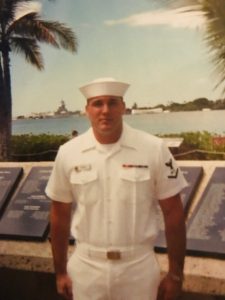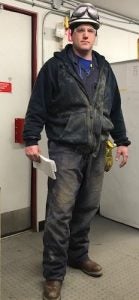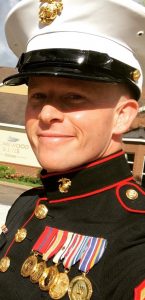When he was just 21, Andrew Kiefer McNeill served as the commanding officer of 30 Marines providing security “in a pretty hot area” of Iraq. McNeill knew he was serving a purpose. But he also knew that after four years in the military and two deployments to Iraq, he was lucky to be alive and ready to try something new.
Chad Harbin reached the same conclusion. After enlisting in the Navy as a high school senior following the 9/11 attacks, Harbin was part of an American counter-narcotics team patrolling the Pacific and the Caribbean. Harbin loved the military but after five-plus years, he was ready to “come home and live a more traditional lifestyle.”
What comes next for returning service members varies greatly. Tales of veterans coming home and struggling to transition back to civilian life are all too common.
For McNeill and Harbin, both found rewarding work that instilled pride in them not too dissimilar from what they felt serving their country - in the fuel refining and petrochemical industries. Both veterans are employed by Phillips 66.
The oil, gas and petrochemical industries employ nearly 185,000 veterans, including nearly 6,000 women and 41,000 minority veterans. Recruitment has been boosted through the industry’s partnerships with Hiring Our Heroes and American Jobs for America’s Heroes, national campaigns that connect veterans with employers.
“They are an essential and highly valued part of our workforce,” said Chet Thompson, AFPM President and CEO. “More than a million jobs in the oil, gas and petrochemical industries are expected to open by 2030, and AFPM members will look to fill those openings with strong leaders that embrace change and take pride in the work. Veterans embody that description and are a perfect fit for our workforce.”
Little did they know at the time of their deployments, but Harbin and McNeill were serving their country while simultaneously gaining the perfect set of skills for work in the refining and petrochemical industries.
Making tough decisions
As captain of the football team and class president at his high school in tiny Mount Olive, Ill., Harbin, now 35, was in many ways the ideal Navy recruit. A natural-born leader, he felt that defending the U.S. was his duty, and he was motivated to contribute to those efforts in any way he could.
That contribution turned out to be more than five years at sea. Though he was just 18 when he enlisted, Harbin was quickly tabbed for leadership roles. And a mind made for engineering was also immediately put to use.

When a Navy ship set sail, Harbin was often tasked with monitoring the equipment to ensure auxiliary systems were running smoothly and vital equipment checks were performed regularly. If the equipment failed, Harbin and company had a backup plan in place to keep the boat running. He was also responsible for making the tough calls on whether sailing on was feasible; if a critical piece of equipment faltered, he might recommend halting patrol.
“It’s really the same way that the refinery works,” Harbin said. “Does it make practical business sense to bring a unit down? Or is it safe to operate at a lower capacity and continue to move forward until a more appropriate time? The refining industry to me is an amazing fit in that sense.”
Harbin never could have predicted just how perfect a fit refinery work would be when he left the Navy in 2007. After studying criminal justice at Southern Illinois University at Edwardsville, he left before graduating to take a job at a nearby manufacturing facility.

Leaving the military and enrolling in college was hard enough, but the monotony of manufacturing work made the transition to civilian life even more difficult. Harbin’s schedule was unpredictable, but his daily tasks were anything but. “You’re doing a repetitive task over and over and trying to make as many as we could,” he said. “You kind of lose yourself and your purpose and your sense of drive.”
Thankfully for Harbin, he quickly rediscovered that sense of purpose when he was hired as a pressure equipment inspector at the Phillips 66 Wood River Refinery in Roxana, Ill. In his role with Phillips 66, Harbin is responsible for the mechanical integrity of the facility’s process equipment. He monitors the thickness of piping pressure and the fluid streams coursing through those pipes, making sure that corrosion is avoided and assessing potential failures. As an operator on Naval ships and now as an inspector at a refinery, Harbin takes his role seriously as a last line of defense.
“Being in the Navy, we were defenders of the free world. The purpose is pretty obvious,” Harbin said. “When you’re working in the refining industry, you have a very important job for your coworkers, your community and the environment to keep the process inside the pipes. We don’t want an environmental disaster, we don’t want a catastrophic medical disaster. It’s very important to follow procedures and do the job right.”
Leading the way
Maybe it was because his father was a military man. Maybe it was his international upbringing, with a British mother and a childhood spent in Argentina. Maybe it was his fluency in English, Spanish and French. But no matter the reason, McNeill, 34, was a natural Marine who seemed born to lead.
In 2003, McNeill started at the bottom of the food chain like any other Marine, as a private. Four years and two tours of duty in Iraq later, he got out as a sergeant. His aptitude for engineering was exceeded only by his ability to connect with people from different backgrounds, earning their trust and respect.

“In the Marine Corps they teach you responsibility at not just a young age, but at a young point in your career, when you’re at the bottom,” McNeill said. “They want you to be a leader from the get-go.”
By 2007, McNeill was ready to leave the military and start his professional life. He returned to Argentina, cashed in the GI Bill to earn his economics degree at Universidad del CEMA in Buenos Aires, and then embarked on his professional career, which began in Houston with a French-owned petroleum company.
From there, McNeill bounced around the energy sector, working for companies small and large, before being laid off in January 2017 after his then-employer was acquired by another company. Though a stressful experience at the time, it ended up leading McNeill to the perfect professional fit: a territory sales manager position at Phillips 66 in Houston.
In his role, McNeill manages large, national accounts buying millions of gallons of products from Phillips 66. He’s on the road frequently throughout Texas and western Louisiana, building relationships and communicating with a broad range of workers. It was all made possible through a Hiring Our Heroes event.
“In places like Houston and Oklahoma City, there are tremendous growth opportunities, especially with an aging workforce that is prevalent in the industries,” said Eric Eversole, Vice President & Executive Director of Hiring Our Heroes at U.S. Chamber of Commerce. “Bringing this next generation of talent is vitally important to the industries.”
McNeill thinks he’s particularly well-suited to work in this industry because of his military background.
“A lot of people do oil and gas because it’s so volatile. There’s not one day that is the same,” McNeill said. “If anyone can take volatility, it’s a Marine.”
“A lot of people do oil and gas because it’s so volatile. There’s not one day that is the same,” McNeill said. “If anyone can take volatility, it’s a Marine.”
Phillips 66 has clearly recognized the benefits of hiring veterans like McNeill and Harbin with roughly 20 percent of the company’s hires for hourly positions going to veterans.
Eversole believes veterans will increasingly find their way to AFPM member companies. Through his work at Hiring our Heroes, Eversole consistently sees three traits in veterans that make them a perfect fit for refining and petrochemical work: attention to detail, strong work ethic and commitment to serve.
“In the refining and petrochemical industries, you have people who are passionate,” Eversole said. Veterans like McNeill and Harbin “know they are keeping the lights on, keeping America moving. They’re making our country stronger and more financially secure and stable. They see this cause as something greater than just themselves.”


